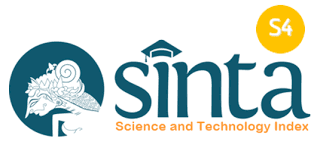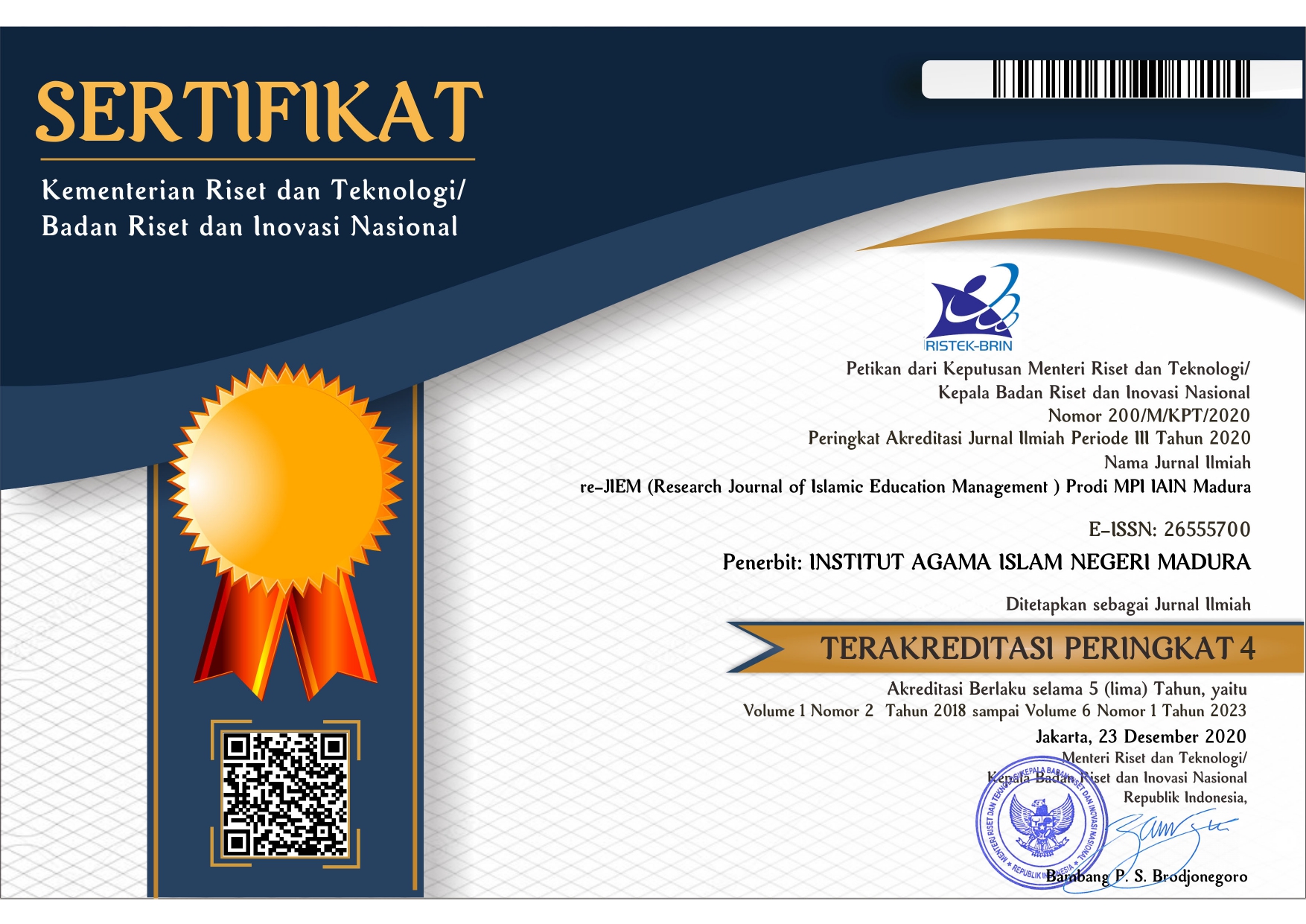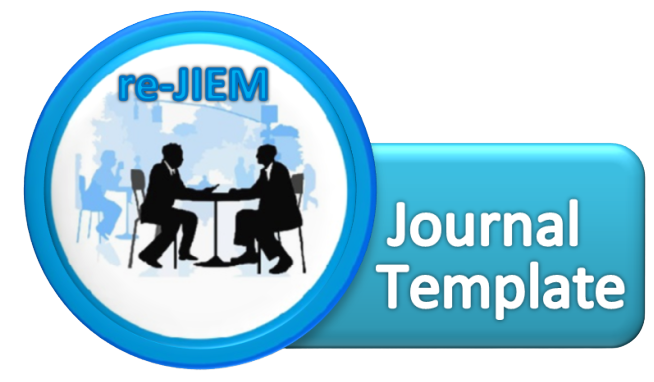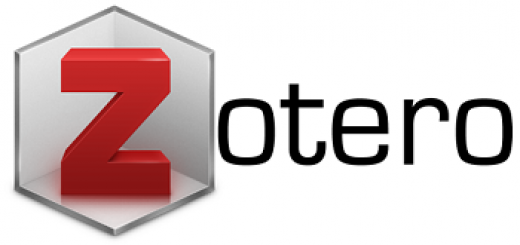MANEJEMEN PROSES DAN PENDEKATAN DALAM PEMBELAJARAN JARAK JAUH (PJJ) BERBASIS BLENDED LEARNING DI MADRASAH ALIYAH AL AZHAR KOTA BANJAR
 Abstract views: 176
,
Abstract views: 176
,
 PDF downloads: 177
PDF downloads: 177
Abstract
The activities of educational institutions are currently still carrying out the learning process online. One of the learning innovations that can be carried out by schools is by implementing Distance Learning based on Blended Learning. This study aims to find out how the management, lesson planning, and evaluation of learning based on Blended Learning are carried out at MA Al Azhar, Banjar City. The number of respondents in this study consisted of 15 teachers spread across various fields of study. Research using qualitative data analysis techniques with descriptive methods. The results of the research show that at the planning stage, the school had previously formulated a special curriculum that was adapted to the Blended Learning learning model, this was also supported by very adequate learning facilities and infrastructure. At the implementation stage, there is a difference in the use of the learning approach with real events in the field, namely the shift in time in utilizing learning. MA Al Azhar the City of Banjar implements a part-time system in the use of learning, a week of face-to-face learning, and the following week an online system. At the evaluation stage, MA Al Azhar City of Banjar carries out face-to-face and online-based evaluations such as using evaluations through the results of recapitulation on Google Classroom and Exel on Google Classroom.
Downloads
References
Ahyani, Hisam. “Curriculum Management And Assessment System In Basic Education (Dikdas) Era Of Industrial Revolution 4.0.” E-Tech : Jurnal Ilmiah Teknologi Pendidikan 9, no. 1 (June 30, 2021). https://doi.org/10.24036/et.v9i1.111579.
Ahyani, Hisam, Agus Yosep Abduloh, and Tobroni Tobroni. “Prinsip-Prinsip Dasar Manajemen Pendidikan Islam Dalam Al-Qur’an.” Jurnal Isema : Islamic Educational Management 6, no. 1 (June 30, 2021): 37–46. https://doi.org/10.15575/isema.v6i1.10148.
Gasong, Dina. Belajar Dan Pembelajaran. Yogyakarta : Deepublish Store (Cv. Budi Utama), 2018.
Khoiriyah, Umi. “Pengaruh Manajemen Kelas Terhadap Motivasi Belajar Siswa Di MTsN 1 Jombang.” Al-Idaroh: Jurnal Studi Manajemen Pendidikan Islam 2, no. 2 (2018): 49–64.
Mulyanti, Budi, Wawan Purnama, and Roer Eka Pawinanto. “Distance Learning In Vocational High Schools During The Covid-19 Pandemic In West Java Province, Indonesia.” Indonesian Journal Of Science And Technology, 2020, 271–82.
Suhada, Dodo Suhada Dodo, Hisam Ahyani, Syamsudin, and Sartono. “The Urgency Of The Role Of Organizational Motivation In Managing Private Islamic Education Institutions In Era 4.0.” Jurnal Alwatzikhoebillah : Kajian Islam, Pendidikan, Ekonomi, Humaniora 7, no. 2 (June 30, 2021): 39–58. https://doi.org/10.37567/alwatzikhoebillah.v7i2.623.
Suryatniani, Ida Ayu Komang. “Menejemen Proses Pembelajaran Jarak Jauh Dimasa Pandemi Covid-19.” Satya Sastraharing : Jurnal Manajemen 4, no. 2 (December 31, 2020): 36–47. https://doi.org/10.33363/satya-sastraharing.v4i2.608.
Utomo, Raden Adji Suryo, and Fitri Nur Mahmudah. “The Implementation of Distance Learning during the Covid-19 Pandemic.” Madrasah: Jurnal Pendidikan dan Pembelajaran Dasar 13, no. 2 (April 5, 2021): 114–25. https://doi.org/10.18860/mad.v13i2.11330.
Yusuf, Andi Ujang. “Kebutuhan Ilmu Manajemen Pendidikan Islami Dalam Menjawab Tantangan Era Revolusi 4.0.” Islamic Management: Jurnal Manajemen Pendidikan Islam 3, no. 01 (January 29, 2020): 93–108. https://doi.org/10.30868/im.v3i01.688.
. Adisusilo, Sutarjo. 2014. Pembelajaran Nilai - Karakter : Konstruktivisme Dan Vct Sebagai Inovasi Pendekatan Pembelajaran Afektif. Jakarta : Rajawali Pers.
Ahyani, Hisam. 2021. “Curriculum Management And Assessment System In Basic Education (Dikdas) Era Of Industrial Revolution 4.0.” E-Tech : Jurnal Ilmiah Teknologi Pendidikan 9(1). Doi: 10.24036/Et.V9i1.111579.
Ahyani, Hisam, Agus Yosep Abduloh, And Tobroni Tobroni. 2021. “Prinsip-Prinsip Dasar Manajemen Pendidikan Islam Dalam Al-Qur’an.” Jurnal Isema : Islamic Educational Management 6(1):37–46. Doi: 10.15575/Isema.V6i1.10148.
Atsani, L. G. M. Z. 2020. Transformasi Media Pembelajaran Pada Masa Pandemi Covid-19. Jurnal: Studi Islamvol. 1 No. 2 Hal 44-54. Alhikmah
Gasong, Dina. 2018. Belajar Dan Pembelajaran. Yogyakarta : Deepublish Store (Cv. Budi Utama).
Charles, M. 1999. Reigeluth, Instrutional Desing Theories And Strategies. A New Paradigm Of Instructional Theory. Vol Ii, Hal 143. New Jersey: Lawrence Associates, Publisher.
Curti, Dkk. 1996. Kombinasi Bisnis Dan Profesional. Bandung: Remaja Rosdakarya.
Gold, L., & Maitland, C. 1999. What’s the difference? A riview of contenporary research on the effectiveness of distance learning in higher education. Washington: Institute for Higher Education Policy.
Holmberg, B. 2005. The Evaluation, Principles and Practices of Distance Education. Oldenburg: Bibliotheksund Informatonssystem der. Carl von Ossietzky universitat Oldenburg.
Hutami, M. S., & Nugraheni, A. S. 2020. Metode Pembelajaran Melalui Whatsapp Group Sebagai Antisipasi Penyebaran Covid-19 pada AUD di TK ABA Kleco Kotagede. Jurnal: Pendidikan Anak Usia Dini, Vol 9(1) Hal 126-130. Paudia.
Khoiriyah, Umi. 2018. “Pengaruh Manajemen Kelas Terhadap Motivasi Belajar Siswa Di Mtsn 1 Jombang.” Al-Idaroh: Jurnal Studi Manajemen Pendidikan Islam 2(2):49–64.
Lailatul Maskhuroh, dkk. 2020. Penerapan Cooperative Learning dalam Pembelajaran Materi Tarikh Berbatukan Internet di SMPN 1 Jombang. Jurnal: Manajemen Pendidikan, Vol 09 No 1, Maret 2020 hal 50. Urwatul Wutsqo
Margaret, E. Gredler. 1991. Learning and Instruction Theory Into Paractice, terjemahan Munadir. Jakarta: Rajawali
Mulyanti, Budi, Wawan Purnama, and Roer Eka Pawinanto. 2020. “Distance Learning In Vocational High Schools During The COVID-19 Pandemic In West Java Province, Indonesia.” Indonesian Journal Of Science And Technology 271–82.
Rue, Leslie W & Byars Lloyd L. 2000. Human Resources Management. Boston: Irwin.
Saifudin Zuhri, Mutmainah. 2019. Pengaruh Kompetensi Sosial Guru dan Pola Asuh Orang Tua Terhadap Iklim Belajar di Kelas IX SMP Muhammadiyah Serpong, Tangerang Selatan Banten. Jurnal: Ilmu Pendidikan Islam, Vol I.
Setiawan, A. R. 2020. Pembelajaran Tematik Berorientasi Literasi Saintifik. Jurnal: Journal of Elementary Education Vol 4 (1), 24 Januari, Hal 71-80. Basicendu.
Simonson, M. 2019. Distance Learning Journal. Book 2, Vol. 16. Charlotte: Information Age Publishing.
Suhada, Dodo Suhada Dodo, Hisam Ahyani, Syamsudin, And Sartono. 2021. “The Urgency Of The Role Of Organizational Motivation In Managing Private Islamic Education Institutions In Era 4.0.” Jurnal Alwatzikhoebillah : Kajian Islam, Pendidikan, Ekonomi, Humaniora 7(2):39–58. Doi: 10.37567/Alwatzikhoebillah.V7i2.623.
Suryatniani, Ida Ayu Komang. 2020. “Menejemen Proses Pembelajaran Jarak Jauh Dimasa Pandemi Covid-19.” Satya Sastraharing : Jurnal Manajemen 4(2):36–47. Doi: 10.33363/Satya-Sastraharing.V4i2.608.
Utomo, Raden Adji Suryo, And Fitri Nur Mahmudah. 2021. “The Implementation Of Distance Learning During The Covid-19 Pandemic.” Madrasah: Jurnal Pendidikan Dan Pembelajaran Dasar 13(2):114–25. Doi: 10.18860/Mad.V13i2.11330.
Wibowo. 2013. Menegemen Perubahan. Jakarta: RajaGrafindo Persada
Yusuf, Andi Ujang. 2020. “Kebutuhan Ilmu Manajemen Pendidikan Islami Dalam Menjawab Tantangan Era Revolusi 4.0.” Islamic Management: Jurnal Manajemen Pendidikan Islam 3(01):93–108. Doi: 10.30868/Im.V3i01.688.
Copyright (c) 2022 Syamsudin, Suharyanto H Soro, Hisam Ahyani

This work is licensed under a Creative Commons Attribution-ShareAlike 4.0 International License.
Authors who publish with this journal agree to the following terms:
Authors retain copyright and grant the journal right of first publication with the work simultaneously licensed under a Creative Commons Attribution-ShareAlike 4.0 International License that allows others to copy and redistribute the material in any medium or format with an acknowledgment of the work's authorship and initial publication in this journal and also allows to remix, transform, and build upon the material for any purpose, even commercially with contributions under the same license as the original.
Authors are able to enter into separate, additional contractual arrangements for the non-exclusive distribution of the journal's published version of the work (e.g., post it to an institutional repository or publish it in a book), with an acknowledgment of its initial publication in this journal.
Authors are permitted and encouraged to post their work online (e.g., in institutional repositories or on their website) prior to and during the submission process, as it can lead to productive exchanges, as well as earlier and greater citation of published work.



























